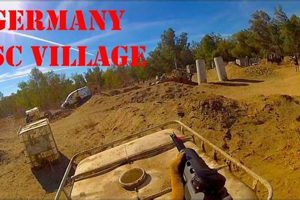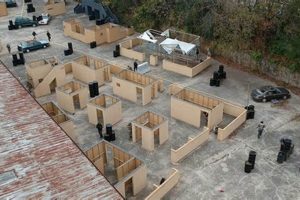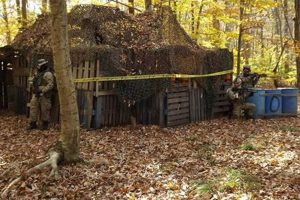Designated locations within the state of New Jersey specifically equipped and sanctioned for the sport of airsoft. These spaces offer a variety of terrains and constructed environments intended to simulate real-world combat scenarios, providing a safe and controlled environment for participants to engage in tactical simulations using realistic replica firearms that fire plastic projectiles.
The presence of these locations fosters community engagement, promotes physical activity, and provides a structured outlet for recreational competition. Their establishment supports local economies through associated businesses such as equipment retailers and related services. Historically, their development reflects a growing interest in realistic simulation activities and a desire for dedicated, regulated playing areas.
The following sections will delve into specific aspects of these recreational areas, including their geographic distribution, the types of playing environments offered, and the rules and regulations governing their operation within the state.
The following represents crucial advisories to ensure a safe and fulfilling experience at designated New Jersey airsoft locations. Adherence to these guidelines promotes responsible participation and minimizes potential risks.
Tip 1: Verify Field Regulations: Prior to arrival, thoroughly review the specific rules enforced by the selected location. Regulations concerning projectile velocity, approved gear, and prohibited items vary significantly between facilities.
Tip 2: Adhere to Safety Protocols: Eye protection certified to meet or exceed ANSI Z87.1 standards is mandatory at all times within designated play areas. Failure to comply results in immediate expulsion.
Tip 3: Understand Weapon Handling Procedures: Safe weapon handling is paramount. Keep airsoft replicas in a designated safe mode when not actively engaged. Never point a replica at individuals outside of authorized engagement zones.
Tip 4: Observe Field Boundaries: Remain within the demarcated play area at all times. Trespassing into unauthorized zones can result in injury and may constitute a violation of property rights.
Tip 5: Communicate Effectively: Utilize clear and concise communication during gameplay. Use established callouts to indicate friendly positions and potential threats.
Tip 6: Hydrate Regularly: Physical exertion during gameplay necessitates adequate hydration. Bring sufficient water and replenish fluids frequently to avoid dehydration.
Tip 7: Dress Appropriately: Wear durable clothing that provides adequate protection against environmental hazards and projectile impacts. Consider knee and elbow protection for added safety.
Compliance with these directives fosters a secure and enjoyable environment for all participants, minimizing the likelihood of accidents or rule infractions.
The subsequent sections will build upon this foundation, providing additional insights into the operational aspects of New Jersey airsoft locations.
1. Location Accessibility
The accessibility of designated airsoft locations significantly impacts participation rates and the overall success of New Jersey’s airsoft community. Geographic proximity to population centers, ease of transportation, and the availability of parking facilities are all critical factors influencing an individual’s decision to engage in the sport. Inadequate accessibility can act as a barrier, limiting opportunities for potential players, particularly those without private transportation or residing in underserved areas. A field’s presence on or near public transportation routes can broaden its appeal and inclusivity.
Conversely, locations with convenient access tend to attract a larger and more diverse player base. For example, airsoft fields situated near major highways or urban centers experience higher traffic volume due to increased visibility and reduced travel time. Furthermore, the availability of ample parking mitigates logistical challenges, encouraging participation by individuals traveling from longer distances. Clear signage and well-maintained access roads also contribute to a positive initial experience, influencing repeat visits and word-of-mouth referrals. The practical application of this understanding involves strategic field placement and infrastructure development to maximize accessibility.
In conclusion, location accessibility is a vital component of a thriving airsoft scene in New Jersey. Overcoming accessibility challenges through strategic planning and infrastructural improvements can broaden participation, foster community growth, and contribute to the sustained success of these recreational venues. Addressing these issues ensures equitable access to the sport and promotes a more inclusive environment for all interested individuals.
2. Field Terrain Diversity
Field terrain diversity is a critical element in shaping the airsoft experience within New Jersey locations. The variations in landscape and constructed environments significantly influence gameplay tactics, strategic approaches, and overall participant engagement.
- Woodland Environments
These areas feature dense vegetation, natural obstacles, and varying elevation changes, creating opportunities for ambushes, concealment, and long-range engagements. Examples include forested areas offering cover and concealment for maneuvering, influencing player tactics towards stealth and reconnaissance.
- Urban/CQB Environments
These simulate built-up areas with structures, barricades, and tight corridors. Such environments demand close-quarters combat skills, fast reflexes, and strategic use of cover. The design of these zones often dictates specific engagement rules and emphasizes tactical teamwork.
- Open Fields/Plains
Expansive areas with limited natural cover favor long-range engagements and emphasize marksmanship. The lack of concealment necessitates careful positioning and coordinated movement, requiring participants to adapt their strategies accordingly.
- Mixed Terrain Scenarios
A combination of woodland, urban, and open field elements provides a dynamic and challenging gameplay experience. These environments require players to adapt their tactics to the changing terrain, promoting versatility and strategic thinking. They offer the most realistic combat simulations.
The deliberate incorporation of diverse terrain types within New Jersey’s airsoft venues creates a dynamic and engaging experience for participants. This variety not only enhances the realism of simulated combat scenarios but also caters to a wider range of play styles and tactical preferences, contributing to a thriving and diverse airsoft community.
3. Safety regulations adherence
Strict adherence to safety regulations is paramount within designated airsoft locations in New Jersey. These regulations are designed to minimize risk of injury and ensure a safe and enjoyable experience for all participants, forming the foundation upon which these venues operate.
- Mandatory Eye Protection
Eye protection certified to meet or exceed ANSI Z87.1 standards is universally required. The impact resistance of these goggles or masks safeguards against projectile-related eye injuries, which are a primary concern in airsoft activities. Failure to comply results in immediate expulsion from the playing field.
- Velocity Limits Enforcement
Airsoft replicas are subject to strict velocity limits, typically measured in feet per second (FPS) using a chronograph. These limits, often varying depending on the type of replica and engagement distance, minimize the potential for injury from projectile impacts. Refusal to comply with these limitations can have ramifications ranging from suspension to permanent expulsion.
- Restricted Engagement Distances
Minimum engagement distances are often enforced, particularly for high-powered replicas. These distances, typically measured in feet, are implemented to reduce the risk of close-range injuries. Some fields enforce a “bang kill” or “safety kill” rule, where a player within the minimum engagement distance calls out “bang” instead of firing, simulating a close-quarters elimination and negating the need for a direct shot at close range.
- Prohibited Conduct Regulations
Specific behaviors are strictly prohibited to ensure a safe and respectful environment. These regulations typically include prohibitions against blind firing (firing without visually confirming the target), the use of unauthorized pyrotechnics or grenades, and aggressive physical contact. Violations of these conduct regulations result in disciplinary action.
The consistent and rigorous enforcement of these safety regulations is integral to the operational integrity of airsoft fields throughout New Jersey. By maintaining these standards, venues not only safeguard the well-being of participants but also cultivate a culture of responsibility and respect within the airsoft community.
4. Game Modes Variations
The diversity of available game modes significantly shapes the experience offered by airsoft locations in New Jersey. These variations cater to different player preferences, skill levels, and strategic inclinations, contributing to the overall appeal and competitiveness of the facilities.
- Team Deathmatch (TDM)
TDM is a foundational game mode that pits two teams against each other with the objective of eliminating all opposing players. Its simplicity makes it accessible to novice players, while its fast-paced nature provides a dynamic environment for experienced participants to refine their tactical skills. Many New Jersey locations utilize TDM as a standard offering due to its ease of implementation and broad appeal. For example, many airsoft fields will use TDM at the beginning and end of the games to get the players in the mood.
- Capture the Flag (CTF)
CTF introduces a strategic element by requiring teams to seize the opposing team’s flag while defending their own. This mode necessitates coordinated teamwork, defensive planning, and offensive maneuvers, appealing to players who enjoy complex tactical challenges. Certain New Jersey fields host CTF events on larger, more intricate playing fields, encouraging strategic depth.
- Scenario-Based Missions
Scenario-based missions incorporate specific objectives, storylines, and rules that simulate real-world combat situations or fictional narratives. These missions often involve complex objectives, resource management, and role-playing elements, providing an immersive and engaging experience. Some New Jersey fields develop elaborate scenario missions, complete with props, costumes, and detailed backstories, to enhance the realism and challenge the participants.
- King of the Hill (KOTH)
KOTH is a game mode where teams compete to control and hold a designated area or “hill” for a set period. This mode emphasizes defensive strategies, area control, and sustained teamwork, appealing to players who prefer a more strategic and objective-based gameplay experience. Many airsoft fields will use KOTH in between TDM and CTF. This is used because it’s a quick gamemode and gets players back in the action.
The availability of diverse game modes is a significant factor influencing the attractiveness of airsoft locations in New Jersey. The more comprehensive range of options available increases the number of players and the skill level of the players.
5. Equipment requirements
Equipment requirements are a foundational aspect of participation at any airsoft location within New Jersey. These requirements directly impact player safety, fairness of gameplay, and the overall operational integrity of the venues. Failure to meet stipulated equipment standards can lead to denied entry or expulsion from the playing field. The requirements are typically non-negotiable and established to maintain a consistent level of safety and regulatory compliance across all participants. For example, every airsoft facility demands properly sealed eye protection that meets a recognized safety standard, without exception.
Further, equipment regulations often extend beyond basic safety gear to encompass the airsoft replicas themselves. Velocity limits, measured in feet per second (FPS), are strictly enforced to prevent excessive projectile force that could cause injury. Chronograph testing is a standard procedure at nearly all New Jersey airsoft fields to ensure replicas adhere to these limits. Additionally, some venues may impose restrictions on magazine capacity, the type of propellant used (e.g., prohibiting high-pressure air systems), or the use of certain accessories, such as laser sights, to promote fair play and prevent unfair advantages. The absence of such regulations would compromise the safety and equity of the game.
In summary, equipment requirements are not merely suggestions but essential prerequisites for participating in airsoft activities at regulated New Jersey fields. These requirements directly influence player safety, the fairness of competition, and the liability management of the venue operators. Compliance ensures a positive and secure environment for all involved, while reinforcing the legitimacy and professionalism of the airsoft community. The careful consideration and strict enforcement of these standards are vital for the continued operation and responsible growth of airsoft as a recreational activity within the state.
6. Community participation
Community participation is an indispensable component of the airsoft landscape within New Jersey. The presence of dedicated locations for the sport necessitates active engagement from players, organizers, and associated businesses to ensure their sustainability and positive impact. The relationship between participation and these fields is symbiotic: robust community involvement fosters the growth and improvement of the fields, while well-maintained and actively managed fields attract greater community engagement. The absence of such participation would inevitably lead to the decline and eventual closure of these recreational venues. For instance, organized events, such as milsims, and charity games rely on community participation to be succesful and create value.
The influence of community participation extends beyond mere attendance. Local teams often contribute to field maintenance and development, building new structures, clearing terrain, and organizing events. This hands-on involvement cultivates a sense of ownership and responsibility, improving the quality of the playing environment and strengthening the bonds within the airsoft community. Furthermore, community participation serves as a crucial channel for communication and feedback, allowing field operators to understand player needs and preferences, leading to improvements in gameplay scenarios, safety protocols, and overall facility management. Positive word-of-mouth and online reviews, fueled by satisfied community members, are invaluable for attracting new players and sustaining the field’s long-term viability.
In conclusion, community participation is not merely an optional element but a fundamental requirement for the success and sustainability of airsoft fields across New Jersey. It is through active involvement, collaborative efforts, and a shared commitment to the sport that these locations thrive, providing a valuable recreational outlet and fostering a sense of camaraderie among enthusiasts. Addressing challenges related to community outreach and engagement is essential for ensuring the continued growth and vitality of the airsoft community within the state.
Frequently Asked Questions About New Jersey Airsoft Fields
This section addresses common inquiries regarding airsoft fields located within New Jersey, providing clear and concise information to facilitate informed decision-making and ensure responsible participation.
Question 1: What constitutes a designated airsoft field in New Jersey?
A designated field is a location specifically authorized for airsoft activities, typically featuring marked boundaries, safety protocols, and established operational procedures. These areas are generally insured and subject to local regulations pertaining to firearms and recreational activities. Operating outside of these authorized spaces carries potential legal and safety risks.
Question 2: What are the primary safety requirements for participation?
Mandatory eye protection certified to meet or exceed ANSI Z87.1 standards is universally required. Additionally, replicas must adhere to established velocity limits, often measured in feet per second (FPS). Adherence to these regulations is strictly enforced, and non-compliance results in immediate expulsion from the playing area.
Question 3: Are there age restrictions for playing at New Jersey airsoft fields?
Age restrictions vary among individual fields. Some locations may permit participation by younger individuals with parental consent, while others maintain a minimum age requirement of 16 or 18 years. Prospective players should confirm the specific age policies of the chosen location prior to arrival.
Question 4: What types of airsoft replicas are permitted?
Permitted replicas are generally limited to those firing 6mm or 8mm plastic BBs. High-powered air rifles, paintball markers, and other potentially dangerous devices are typically prohibited. Furthermore, some fields may restrict the use of certain gas types or modifications that increase velocity beyond regulated limits.
Question 5: Is it necessary to pre-register or reserve a spot at a New Jersey airsoft field?
Pre-registration or reservation is strongly recommended, particularly during peak seasons or for organized events. Many fields have limited capacity and prioritize registered players. Walk-in availability cannot be guaranteed and may result in denied entry. Check with the field for availability and to make sure there are no changes to the schedule.
Question 6: What is the expected cost for a day of play at a New Jersey airsoft field?
Costs vary depending on the field and the services offered. Typical fees range from $25 to $50 for a full day of play. Rental equipment, BBs, and other supplies are generally available for an additional fee. It is advisable to review the field’s pricing structure prior to arrival.
Understanding and adhering to these guidelines fosters a responsible and enjoyable airsoft experience. The provided information aims to promote safe participation and mitigate potential misunderstandings.
The subsequent sections of this article provide further details regarding specific airsoft locations and related resources available within the state.
Conclusion
This exploration of designated airsoft locations within New Jersey has outlined essential considerations for both participants and operators. From understanding safety regulations and terrain diversity to recognizing the importance of community involvement and equipment standards, a comprehensive overview of these recreational venues has been presented. This information serves to promote responsible engagement and enhance the overall airsoft experience within the state.
The continued success and evolution of New Jersey airsoft fields depend on sustained adherence to safety protocols, proactive community engagement, and ongoing adaptation to the evolving needs of players. The insights shared within this article are intended to foster a culture of informed participation and responsible stewardship, ensuring a viable and enjoyable future for the airsoft community within the state.







